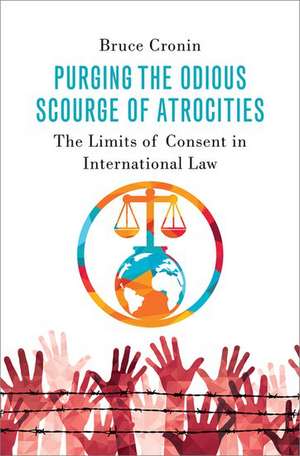Purging the Odious Scourge of Atrocities: The Limits of Consent in International Law
Autor Bruce Croninen Limba Engleză Hardback – 7 noi 2023
Preț: 340.20 lei
Preț vechi: 468.10 lei
-27% Nou
Puncte Express: 510
Preț estimativ în valută:
65.10€ • 70.93$ • 54.85£
65.10€ • 70.93$ • 54.85£
Carte disponibilă
Livrare economică 22-28 martie
Preluare comenzi: 021 569.72.76
Specificații
ISBN-13: 9780197693308
ISBN-10: 019769330X
Pagini: 224
Dimensiuni: 231 x 160 x 33 mm
Greutate: 0.48 kg
Editura: Oxford University Press
Colecția OUP USA
Locul publicării:New York, United States
ISBN-10: 019769330X
Pagini: 224
Dimensiuni: 231 x 160 x 33 mm
Greutate: 0.48 kg
Editura: Oxford University Press
Colecția OUP USA
Locul publicării:New York, United States
Recenzii
This book aims straight at the tangled heart of international law and politics. Obvious atrocities like mass killing and torture are excused by international law's commitment to state consent as the foundation for obligations. Cronin turns this on its head by drawing on history, law, and politics to show that new rules against atrocities have arisen through consensus rather than consent. The book is essential reading at the boundaries between law and politics, human rights and state power, and theory and practice.
In this ambitious book, Bruce Cronin posits a new source of international law-collective international consensus-in arguing that mass atrocities are illegal, even when committed by states that are not bound by applicable treaty or customary law. Written in jargon free prose, anyone interested in how international law develops will be intrigued by this provocative and well substantiated thesis.
Should the international law on atrocities be based on established state practice, consent by states, or consensus through deliberation among jurists and practitioners? Cronin makes a fascinating argument for consensus, based on a theory of transformative moments in international society in terms of its prevailing types of units, the dynamic density of global interactions, and their degree of institutionalization. While some might see the present time as regressing toward sovereign nationalism, Cronin argues forcefully for a collective convergence of opinion on legal standards for atrocity crimes.
In this ambitious book, Bruce Cronin posits a new source of international law-collective international consensus-in arguing that mass atrocities are illegal, even when committed by states that are not bound by applicable treaty or customary law. Written in jargon free prose, anyone interested in how international law develops will be intrigued by this provocative and well substantiated thesis.
Should the international law on atrocities be based on established state practice, consent by states, or consensus through deliberation among jurists and practitioners? Cronin makes a fascinating argument for consensus, based on a theory of transformative moments in international society in terms of its prevailing types of units, the dynamic density of global interactions, and their degree of institutionalization. While some might see the present time as regressing toward sovereign nationalism, Cronin argues forcefully for a collective convergence of opinion on legal standards for atrocity crimes.
Notă biografică
Bruce Cronin is Professor of Political Science at the City College of New York. He specializes in international law, human rights, and international organizations, and is the author of numerous books and articles. His books include Bugsplat: The Politics of Collateral Damage in Western Armed Conflicts; Institutions for the Common Good; and Community under Anarchy.
